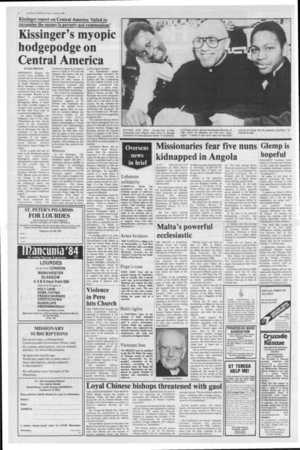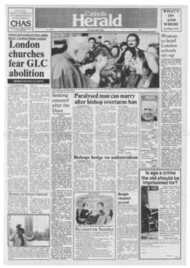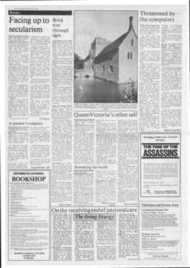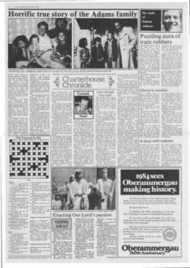Page 2, 27th January 1984
Page 2

Report an error
Noticed an error on this page?If you've noticed an error in this article please click here to report it.
Tags
Share
Related articles
To See The World Or To Solve
Kissinger: The Year He Held The Us Together
Pope Hears Kissinger's Views On Middle East
Reagan's Battle For El Salvador Credibility
Men With Feet Of Clay
Kissinger ' s myopic
hodgepodge on Central America
by Gary MacEoin PRESIDENT Reagan has created more problems for himself than he has resolved by founding a Commission headed by former Secretary of State Henry Kissinger to analyse the Central American Conflict and recommend liang term policies and strategies. Reaction to the Report is overwhelmingly
negative. Its typically Kissingerian efforts to obtain the widest possible support in Congress have produced what the New York Times calls an inconsistent hodgepodge."
The report recognises the indigenous roots of the crisis: "Discontents are real, and for much of the population conditions of life are miserable; just as Nicaragua was ripe for revolution, so the conditions that invite revolution are present elsewhere in the region." Without political, economic and social reforms, military intervention cannot change this reality."
So far, so good. But now we come to the ideological myopia that has characterised Kissinger's entire career, epitomised for Latin Americans by his crucial role in overthrowing Chile's democratically elected president, Salvador Allende, in 1973. Reform must not involve any change in the power structures that are the cause of the widespread misery and repression. "The insurgents, if they win," the Report asserts baldly, "will create a totalitarian regime."
What hypocrisy! Kissinger has never expressed any reservations about the totalitarian regime he brought to power in Chile in 1973 and still supports. His concern, like that of President Reagan, is to prevent the other nations of Central America from following Nicaragua's example and emancipating their economies from United States domination.
The scenario he consequently envisages is a massive increase in military aid so that the oligarchic regimes in El Salvador and Guatemala can destroy the popular forces ranged against them. In ways that are nowhere defined, the victorious armies of the oligarchs will reform themselves, ending what the Report acknowledges is "brutal behaviour" and "indiscriminate murder of suspects." The oligarchs, for their part, once they are again in firm control, will with massive United States aid reform their economies and societies, thus bringing an end to the misery they caused in the first place.
Rhetoric
As for Nicaragua, "the Commission believes that the Sandinists regime will pose a continuing threat to stability in the region." It accordingly recommends that "existing incentives and pressures on the Nicaragua regime" continue until that regime recognises the United States hegemony in the region and modifies its policies appropriately. This means continued overt and covert aid to the campaign of sabotage and terrorism being waged by the somocistas from bases in Honduras, as well as the massive presence of United States land, sea and air forces on Nicaragua's borders.
The Salvadorean regime understandably welcomed the proposed vast increases in military aid, but a spokesman for the Catholic Church in El Salvador condemned this proposal as a grave error. Speaking for Archbishop Arturo Rivera y Damas, he said, "Mr Kissinger has erred completely by ignoring the Christian forces, which are a vital force in the country. He has excluded the possibility of dialogue which the archbishop had proposed. He has not listened to us. We have been very clear in our opposition to military aid."
This comment focuses what is the central ideological issue not only in El Salvador but in all of Central America. Reagan and Kissinger present the popular forces as puppets of the Soviet Union blindly committed to an evil system (Marxism-Leninism) with which no accommodation is possible.
Archbishop Rivera, like his predecessor Oscar Romero, insists that the dominant inspiration is the preferential option for the poor to which the Church committed itself at the meetings of the Latin American bishops at Medellin in 1%8 and at Puebla in 1979. For Reagan and Kissinger, the opposition consists of a small clique of extreme leftists. For Rivera it embraces the entire spectrum of public opinion except the ultraright. It is the United States policy of resistance to inevitable and desirable change that builds support for Marxism.
In the United States itself, the Report has done nothing to lessen resistance to the Reagan policies. "There is rhetoric to satisfy every imaginable constituency," commented Senator Christopher Dodd, a powerful member of the Foreign Relations Committee, "but there is no policy." For Senator Gary Hart, a contender for the presidency, "it failed to recognise that the enemy in Central America is poverty, not communism."
If anything good is to come out of the Report, it will be an intensification of the debate on what the United States should do or cease doing in Central America. Most of the early comments stress the same point as Senator Hart, a point that directly challenges the basic Reagan-Kissinger thesis. As Stephen Hellinger, a director of the Development Group for Alternative Policies, put it: "A policy that ties us to the governing elite will never be able to support the basic change necessary if people there are ever going to improve their lives."
blog comments powered by Disqus











